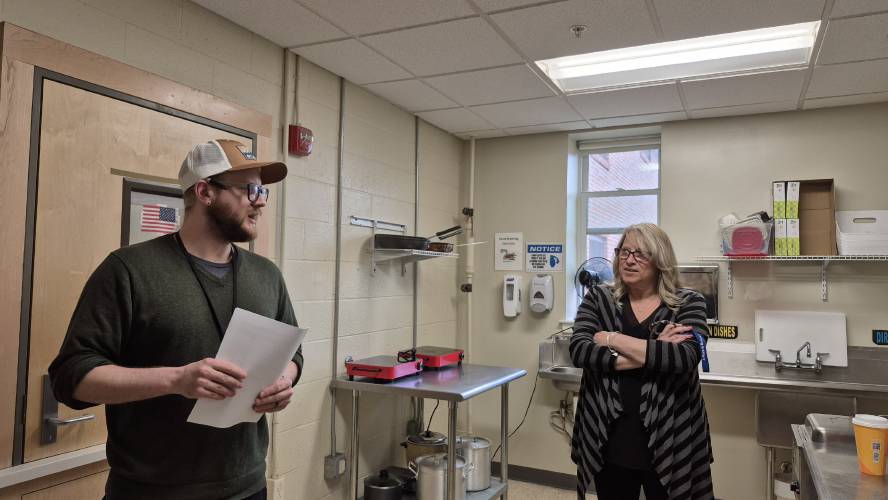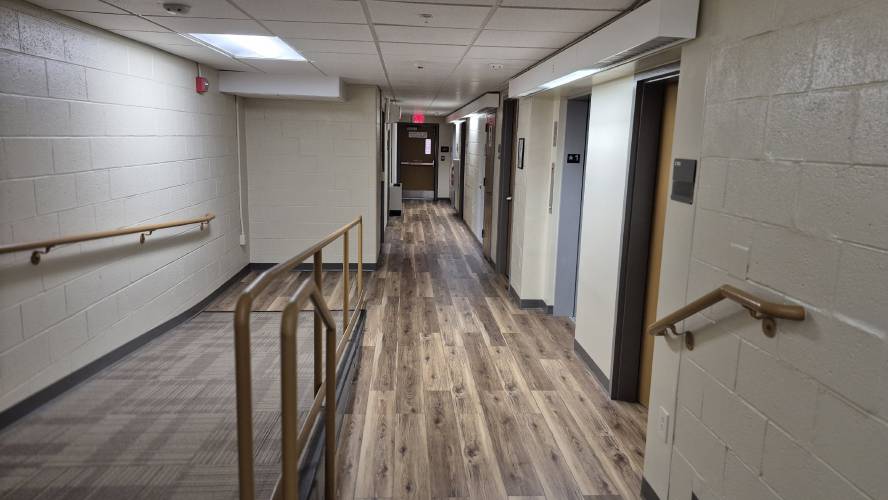Transitional housing at risk after New Hampshire lawmakers vote to sell state-owned building
| Published: 04-15-2025 6:26 PM |
Tim Maley arrived at the Philbrook Adult Transitional Facility in Concord last March. Until then, he had been receiving care at New Hampshire Hospital, just half a mile down the road.
He’s found routine and a sense of belonging, sharing meals with other residents and working in the kitchen, where he is paid to assemble salads and sandwiches and prepare other foods.
After months of waiting, Maley, 59, is finally ready to take his next step: moving into an apartment in Newport where he’ll live with family and friends close by.
“I feel good. That’s my hometown,” said Maley. “I’m going back home. But I have a little fear of moving in.”
Philbrook is a step-down facility designed to help people transition back to the community after an involuntary emergency admission to the hospital. Residents like Maley are on a conditional release, which can include continuing mental health treatment and avoiding substances like alcohol.
North American Family Institute North, the nonprofit that runs the 16-bed facility, leases a portion of the building from the state at no cost, providing transitional housing services as part of their rent-free contract. Their future at the facility is in up in the air. Last week, the New Hampshire House of Representatives voted to sell the entire building.
Luke Reynard, executive director of the nonprofit, said he’s worried that selling the building could leave the 16 residents without a place to live, especially given the current shortage of transitional housing in the state.
Even if a new owner were to honor their lease, there’s no guarantee they wouldn’t be charged a significant amount of rent.
Article continues after...
Yesterday's Most Read Articles
 Hopkinton structure fire spreads to surrounding brush and fields
Hopkinton structure fire spreads to surrounding brush and fields
 ACLU asks New Hampshire federal judge to reinstate student status for more than 100 international students
ACLU asks New Hampshire federal judge to reinstate student status for more than 100 international students
 Concord man arrested after middle schooler drug exposure
Concord man arrested after middle schooler drug exposure
 ‘Frivolous and lacking merit’: Complaint against golf committee members over clubhouse vote dismissed
‘Frivolous and lacking merit’: Complaint against golf committee members over clubhouse vote dismissed
 ‘A bit Kafkaesque’: Federal judge spars with government lawyer over status of Dartmouth international student
‘A bit Kafkaesque’: Federal judge spars with government lawyer over status of Dartmouth international student
 Granite Geek: A contrary Earth Day thought – we shouldn’t pick up litter
Granite Geek: A contrary Earth Day thought – we shouldn’t pick up litter
“There is uncertainty, especially for the people living here, they monitor the news too, so it’s just a little stressful,” said Reynard.
Under an amendment recently approved by the House, the property would first be offered to the City of Concord and then to Merrimack County.
If neither the city nor the county accepts the offer by Jan. 1, 2026, the state will put out a request for proposals, with a finalized sale expected before June 30, 2027.
Revenue from the sale would be directed to the state’s general fund.
Mental health advocates warn that losing a transitional facility like Philbrook could have ripple effects across New Hampshire’s mental health system, which the state has been working hard to stabilize and improve alongside community mental health providers and advocates.
Lisa Madden, president and CEO of Riverbend Mental Health Center in Concord, said the potential sale illustrates a troubling disconnect between the state’s goals and ongoing efforts to support individuals in crisis under Mission Zero, an initiative to end emergency department boarding of psychiatric patients.
“Any disruption to the system means we go way back, and now you’re going to have more people waiting in the ED, longer lengths of stay at the hospital, lower level of care and less opportunity for community-based living,” said Madden in an interview with the Monitor. “That is not where we want to go.”
State data shows that, in March, an average of 80 patients at New Hampshire Hospital were cleared for discharge per day but had nowhere to go simply because there wasn’t enough transitional housing available.
Before NFI North took over Philbrook in February 2024, the facility was operated by the state.
According to Reynard, it functioned more like a shelter back then, and it lacked supportive services and rehabilitation resources.
Now, the facility offers a range of daily programming for residents, including yoga, vocational support, weekly visits from a psychiatrist and other mental health services.
Most importantly, Michele Canning, the programming director, said their goal is to help residents adjust to independent living and prepare them for life after leaving the facility.
“Some of our participants don’t have families. So, they become part of their family right there,” said Canning. “We are just trying to build that support and build this kind of community for them once they leave.”
Sruthi Gopalakrishnan can be reached at sgopalakr ishnan@cmonitor.com












 Baseball: Slow night at the plate costs Concord in loss to Windham, 3-1
Baseball: Slow night at the plate costs Concord in loss to Windham, 3-1 New Hampshire births fell to a modern low in 2024
New Hampshire births fell to a modern low in 2024 ‘New Hampshire is just going to embarrass itself’: Former Child Advocate warns against proposed office cuts
‘New Hampshire is just going to embarrass itself’: Former Child Advocate warns against proposed office cuts Bow recognizes two DPW workers who rescued driver of overturned propane truck
Bow recognizes two DPW workers who rescued driver of overturned propane truck
